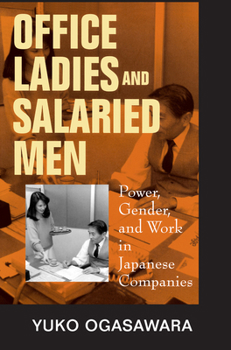Office Ladies and Salaried Men: Power, Gender, and Work in Japanese Companies
Select Format
Select Condition 
Book Overview
In large corporations in Japan, much of the clerical work is carried out by young women known as "office ladies" (OLs) or "flowers of the workplace." Largely nameless, OLs serve tea to the men and type and file their reports. They are exempt from the traditional lifetime employment and have few opportunities for promotion. In this engaging ethnography, Yuko Ogasawara exposes the ways that these women resist men's power, and why the men, despite their exclusive command of authority, often subject themselves to the women's control. Ogasawara, a Japanese sociologist trained in the United States, skillfully mines perceptive participant-observation analyses and numerous interviews to outline the tensions and humiliations of OL work. She details the subtle and not-so-subtle ways that OLs who are frustrated by demeaning, dead-end jobs thwart their managers and subvert the power structure to their advantage. Using gossip, outright work refusal, and public gift-giving as manipulative strategies, they can ultimately make or break the careers of the men. This intimate and absorbing analysis illustrates how the relationships between women and work, and women and men, are far more complex than the previous literature has shown.
Format:Paperback
Language:English
ISBN:0520210441
ISBN13:9780520210448
Release Date:June 1998
Publisher:University of California Press
Length:280 Pages
Weight:0.80 lbs.
Dimensions:0.7" x 6.1" x 9.0"
Customer Reviews
2 ratings
Subvert the dominant paradigm.
Published by Thriftbooks.com User , 22 years ago
This book (actually a dissertation) describes the power-hierarchy in Japanese companies. Throughout modernity-and into post-modernity- women in the professional Japanese workforce are often given jobs of menial nature. These women, so called "office ladies" or "office flowers", are not given the opportunity for career advancement. Instead they are bounded to their male superiors for whatever clerical jobs these men may desire. Ogasawara, however, posits that "office ladies" actually hold more power than is perceived on the surface. These women, because of their ability to make copies, types documents, and in some cases write detailed reports for the men, are highly valued. These men must, in a sense, "curry favor" with these women in order to: 1) Prove that they will be competent managers in the future and 2) handle all that is required of them from their superiors. (The abundant workload often leaves male employees with little time for making copies, running errands etc.) The methodology the author uses is participant observation. A great book for anyone interested in Japanese societal structure
Very good study of gender and power in Japanese business
Published by Thriftbooks.com User , 25 years ago
The author writes clearly and convincingly about the experience of being an office lady. She explains her entry into the work place, the importance of pecking order among both men and women, and more interestingly, the interaction between men and women in the workplace. A fascinating study on formal gift giving between men and women, and the opportunities to give strong feedback to workers who have displeased the gift giver is worth the price of the book.For readers looking for an insight into gender related work issues in Japan, and some wonderful clues about the real balance of power in the office, read on.






